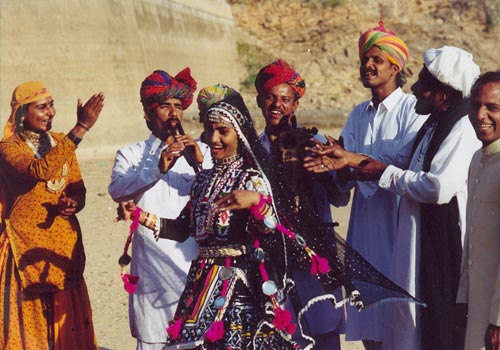With three weeks to go to the 2010 Rainforest World Music Festival, Mallika Naguran finds out what festival director Randy Raine-Reusch has in store for die-hard RWMF fans that travel all the way to the heart of Borneo each year in July from around the world.
What kind of musical experience will the three-day concert provide? Maybe you can highlight a few winners, Farafina among them for sure.
There is a very wide selection this year, including a very rare style of music from the Bidayuh people of Sarawak on ancient tube zithers. This is a type of music that has been around literally for centuries and is still surviving in only a few small villages in this region.

Musafir Gypsies of Rajasthan
We have of course superstars like Farafina from Burkina Faso and the Musafir Gypsies of Rajasthan known for their participation in the amazing musical film Latcho Drom. There are numerous other highlights this year, from Yerboli a traditional Uzbek singer from China, to the amazing Bulgarian vocals of the Bisserov Sisters, to the Russian folk music of Reelroad, to the Afro Peruvian superstars Novalima, to rare music from the remote province of Portugal played by Galandum Galundaina, to fiery finger work on the amazing Tsugaru shamisen performed by the Kimura-Ono duo, to rare bagpipe music from southern Iran by the Shanbehzadeh Ensemble.
We also have the Cetic sounds of Monster Ceilidh Band, the quirky French traditions of Minuit Guibolles, the passion of the Reunion Islands with Leila Negrau, the powerful Indian grooves of Layatharanga, ancient and modern music from the Czech Republic with BraAgas, infectious dance music from Italy's I Beddi, French Canadian folk and step dancing from de Temps Antan, the heartfelt Islamic music of Indonesia's Debu, the Latin grooves of Australia's Watussi, and the magical sounds of the Sarawakian Rainforest with Bakih's electric sape.
How will the workshops this year differ from the previous, if at all?
We are having two participatory dance workshops this year: one of Russian Folk Dancing and the other is Balkan Folk Dancing. This is great fun and a guaranteed great time for all. Plus we are featuring an intimate daytime concert of the very rare music of the Bidayuh people in the Theatre. I have tried to create more jams in the workshops and there are some great workshop leaders this year.
What would be some creative highlights? Last year, for example, we had Women's Voices and drums and bamboo, which were thoroughly enjoyable.
I always think the Women's Voices workshop is one not to miss. There are a few more percussion workshops this year as we have a plethora of great drummers, and my personally favourite will be the bagpipe workshop!
As a festival director, do you visualize the three-day concert as a fluid whole, perhaps a slow and steady start (typically Fridays) building up to a climax (Sunday night). What's your creative direction for this year's RWMF?
I tried to build a bit more excitement each night this year, and the final band each night should get everyone's feet moving, but I was really looking for a diversity of styles this year and trying to introduce the audience to things that they will just never hear or see anywhere else. I think this is the most diverse programs you will see anywhere.
Yet I always try to bring some stars and keep the quality high. Of course I am also interested to bring musicians out from villages; these musicians have never been on a concert stage before, so the audience can experience the real traditions, as they were meant to be played. So there are roots to the past and forays into the future all at the same festival.
This is definitely one of the world's most unique festival as only those that have been here know. It is often magical! If you have never been here you are missing an amazing experience, which is why we have so many people that have been here almost every year of the festival.
Rainforest World Music Festival - July 9-11, 2010, http://www.rainforestmusic-borneo.com
Miri International Jazz Festival - May 13-14 2011, http://mirijazzfestival.com